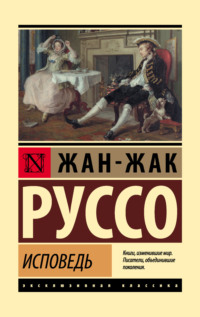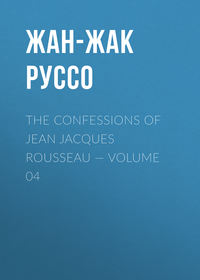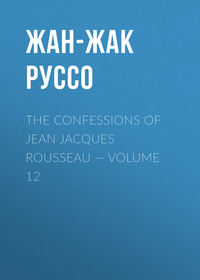 полная версия
полная версияEmile
The body must be strong enough to obey the mind; a good servant must be strong. I know that intemperance stimulates the passions; in course of time it also destroys the body; fasting and penance often produce the same results in an opposite way. The weaker the body, the more imperious its demands; the stronger it is, the better it obeys. All sensual passions find their home in effeminate bodies; the less satisfaction they can get the keener their sting.
A feeble body makes a feeble mind. Hence the influence of physic, an art which does more harm to man than all the evils it professes to cure. I do not know what the doctors cure us of, but I know this: they infect us with very deadly diseases, cowardice, timidity, credulity, the fear of death. What matter if they make the dead walk, we have no need of corpses; they fail to give us men, and it is men we need.
Medicine is all the fashion in these days, and very naturally. It is the amusement of the idle and unemployed, who do not know what to do with their time, and so spend it in taking care of themselves. If by ill-luck they had happened to be born immortal, they would have been the most miserable of men; a life they could not lose would be of no value to them. Such men must have doctors to threaten and flatter them, to give them the only pleasure they can enjoy, the pleasure of not being dead.
I will say no more at present as to the uselessness of medicine. My aim is to consider its bearings on morals. Still I cannot refrain from saying that men employ the same sophism about medicine as they do about the search for truth. They assume that the patient is cured and that the seeker after truth finds it. They fail to see that against one life saved by the doctors you must set a hundred slain, and against the value of one truth discovered the errors which creep in with it. The science which instructs and the medicine which heals are no doubt excellent, but the science which misleads us and the medicine which kills us are evil. Teach us to know them apart. That is the real difficulty. If we were content to be ignorant of truth we should not be the dupes of falsehood; if we did not want to be cured in spite of nature, we should not be killed by the doctors. We should do well to steer clear of both, and we should evidently be the gainers. I do not deny that medicine is useful to some men; I assert that it is fatal to mankind.
You will tell me, as usual, that the doctors are to blame, that medicine herself is infallible. Well and good, then give us the medicine without the doctor, for when we have both, the blunders of the artist are a hundredfold greater than our hopes from the art. This lying art, invented rather for the ills of the mind than of the body, is useless to both alike; it does less to cure us of our diseases than to fill us with alarm. It does less to ward off death than to make us dread its approach. It exhausts life rather than prolongs it; should it even prolong life it would only be to the prejudice of the race, since it makes us set its precautions before society and our fears before our duties. It is the knowledge of danger that makes us afraid. If we thought ourselves invulnerable we should know no fear. The poet armed Achilles against danger and so robbed him of the merit of courage; on such terms any man would be an Achilles.
Would you find a really brave man? Seek him where there are no doctors, where the results of disease are unknown, and where death is little thought of. By nature a man bears pain bravely and dies in peace. It is the doctors with their rules, the philosophers with their precepts, the priests with their exhortations, who debase the heart and make us afraid to die.
Give me a pupil who has no need of these, or I will have nothing to do with him. No one else shall spoil my work, I will educate him myself or not at all. That wise man, Locke, who had devoted part of his life to the study of medicine, advises us to give no drugs to the child, whether as a precaution, or on account of slight ailments. I will go farther, and will declare that, as I never call in a doctor for myself, I will never send for one for Emile, unless his life is clearly in danger, when the doctor can but kill him.
I know the doctor will make capital out of my delay. If the child dies, he was called in too late; if he recovers, it is his doing. So be it; let the doctor boast, but do not call him in except in extremity.
As the child does not know how to be cured, he knows how to be ill. The one art takes the place of the other and is often more successful; it is the art of nature. When a beast is ill, it keeps quiet and suffers in silence; but we see fewer sickly animals than sick men. How many men have been slain by impatience, fear, anxiety, and above all by medicine, men whom disease would have spared, and time alone have cured. I shall be told that animals, who live according to nature, are less liable to disease than ourselves. Well, that way of living is just what I mean to teach my pupil; he should profit by it in the same way.
Hygiene is the only useful part of medicine, and hygiene is rather a virtue than a science. Temperance and industry are man's true remedies; work sharpens his appetite and temperance teaches him to control it.
To learn what system is most beneficial you have only to study those races remarkable for health, strength, and length of days. If common observation shows us that medicine neither increases health nor prolongs life, it follows that this useless art is worse than useless, since it wastes time, men, and things on what is pure loss. Not only must we deduct the time spent, not in using life, but preserving it, but if this time is spent in tormenting ourselves it is worse than wasted, it is so much to the bad, and to reckon fairly a corresponding share must be deducted from what remains to us. A man who lives ten years for himself and others without the help of doctors lives more for himself and others than one who spends thirty years as their victim. I have tried both, so I think I have a better right than most to draw my own conclusions.
For these reasons I decline to take any but a strong and healthy pupil, and these are my principles for keeping him in health. I will not stop to prove at length the value of manual labour and bodily exercise for strengthening the health and constitution; no one denies it. Nearly all the instances of long life are to be found among the men who have taken most exercise, who have endured fatigue and labour. [Footnote: I cannot help quoting the following passage from an English newspaper, as it throws much light on my opinions: "A certain Patrick O'Neil, born in 1647, has just married his seventh wife in 1760. In the seventeenth year of Charles II. he served in the dragoons and in other regiments up to 1740, when he took his discharge. He served in all the campaigns of William III. and Marlborough. This man has never drunk anything but small beer; he has always lived on vegetables, and has never eaten meat except on few occasions when he made a feast for his relations. He has always been accustomed to rise with the sun and go to bed at sunset unless prevented by his military duties. He is now in his 130th year; he is healthy, his hearing is good, and he walks with the help of a stick. In spite of his great age he is never idle, and every Sunday he goes to his parish church accompanied by his children, grandchildren, and great grandchildren."] Neither will I enter into details as to the care I shall take for this alone. It will be clear that it forms such an essential part of my practice that it is enough to get hold of the idea without further explanation.
When our life begins our needs begin too. The new-born infant must have a nurse. If his mother will do her duty, so much the better; her instructions will be given her in writing, but this advantage has its drawbacks, it removes the tutor from his charge. But it is to be hoped that the child's own interests, and her respect for the person to whom she is about to confide so precious a treasure, will induce the mother to follow the master's wishes, and whatever she does you may be sure she will do better than another. If we must have a strange nurse, make a good choice to begin with.
It is one of the misfortunes of the rich to be cheated on all sides; what wonder they think ill of mankind! It is riches that corrupt men, and the rich are rightly the first to feel the defects of the only tool they know. Everything is ill-done for them, except what they do themselves, and they do next to nothing. When a nurse must be selected the choice is left to the doctor. What happens? The best nurse is the one who offers the highest bribe. I shall not consult the doctor about Emile's nurse, I shall take care to choose her myself. I may not argue about it so elegantly as the surgeon, but I shall be more reliable, I shall be less deceived by my zeal than the doctor by his greed.
There is no mystery about this choice; its rules are well known, but I think we ought probably to pay more attention to the age of the milk as well as its quality. The first milk is watery, it must be almost an aperient, to purge the remains of the meconium curdled in the bowels of the new-born child. Little by little the milk thickens and supplies more solid food as the child is able to digest it. It is surely not without cause that nature changes the milk in the female of every species according to the age of the offspring.
Thus a new-born child requires a nurse who has recently become mother. There is, I know, a difficulty here, but as soon as we leave the path of nature there are difficulties in the way of all well-doing. The wrong course is the only right one under the circumstances, so we take it.
The nurse must be healthy alike in disposition and in body. The violence of the passions as well as the humours may spoil her milk. Moreover, to consider the body only is to keep only half our aim in view. The milk may be good and the nurse bad; a good character is as necessary as a good constitution. If you choose a vicious person, I do not say her foster-child will acquire her vices, but he will suffer for them. Ought she not to bestow on him day by day, along with her milk, a care which calls for zeal, patience, gentleness, and cleanliness. If she is intemperate and greedy her milk will soon be spoilt; if she is careless and hasty what will become of a poor little wretch left to her mercy, and unable either to protect himself or to complain. The wicked are never good for anything.
The choice is all the more important because her foster-child should have no other guardian, just as he should have no teacher but his tutor. This was the custom of the ancients, who talked less but acted more wisely than we. The nurse never left her foster-daughter; this is why the nurse is the confidante in most of their plays. A child who passes through many hands in turn, can never be well brought up.
At every change he makes a secret comparison, which continually tends to lessen his respect for those who control him, and with it their authority over him. If once he thinks there are grown-up people with no more sense than children the authority of age is destroyed and his education is ruined. A child should know no betters but its father and mother, or failing them its foster-mother and its tutor, and even this is one too many, but this division is inevitable, and the best that can be done in the way of remedy is that the man and woman who control him shall be so well agreed with regard to him that they seem like one.
The nurse must live rather more comfortably, she must have rather more substantial food, but her whole way of living must not be altered, for a sudden change, even a change for the better, is dangerous to health, and since her usual way of life has made her healthy and strong, why change it?
Country women eat less meat and more vegetables than towns-women, and this vegetarian diet seems favourable rather than otherwise to themselves and their children. When they take nurslings from the upper classes they eat meat and broth with the idea that they will form better chyle and supply more milk. I do not hold with this at all, and experience is on my side, for we do not find children fed in this way less liable to colic and worms.
That need not surprise us, for decaying animal matter swarms with worms, but this is not the case with vegetable matter. [Footnote: Women eat bread, vegetables, and dairy produce; female dogs and cats do the same; the she-wolves eat grass. This supplies vegetable juices to their milk. There are still those species which are unable to eat anything but flesh, if such there are, which I very much doubt.] Milk, although manufactured in the body of an animal, is a vegetable substance; this is shown by analysis; it readily turns acid, and far from showing traces of any volatile alkali like animal matter, it gives a neutral salt like plants.
The milk of herbivorous creatures is sweeter and more wholesome than the milk of the carnivorous; formed of a substance similar to its own, it keeps its goodness and becomes less liable to putrifaction. If quantity is considered, it is well known that farinaceous foods produce more blood than meat, so they ought to yield more milk. If a child were not weaned too soon, and if it were fed on vegetarian food, and its foster-mother were a vegetarian, I do not think it would be troubled with worms.
Milk derived from vegetable foods may perhaps be more liable to go sour, but I am far from considering sour milk an unwholesome food; whole nations have no other food and are none the worse, and all the array of absorbents seems to me mere humbug. There are constitutions which do not thrive on milk, others can take it without absorbents. People are afraid of the milk separating or curdling; that is absurd, for we know that milk always curdles in the stomach. This is how it becomes sufficiently solid to nourish children and young animals; if it did not curdle it would merely pass away without feeding them. [Footnote: Although the juices which nourish us are liquid, they must be extracted from solids. A hard-working man who ate nothing but soup would soon waste away. He would be far better fed on milk, just because it curdles.] In vain you dilute milk and use absorbents; whoever swallows milk digests cheese, this rule is without exception; rennet is made from a calf's stomach.
Instead of changing the nurse's usual diet, I think it would be enough to give food in larger quantities and better of its kind. It is not the nature of the food that makes a vegetable diet indigestible, but the flavouring that makes it unwholesome. Reform your cookery, use neither butter nor oil for frying. Butter, salt, and milk should never be cooked. Let your vegetables be cooked in water and only seasoned when they come to table. The vegetable diet, far from disturbing the nurse, will give her a plentiful supply of milk. [Footnote: Those who wish to study a full account of the advantages and disadvantages of the Pythagorean regime, may consult the works of Dr. Cocchi and his opponent Dr. Bianchi on this important subject.] If a vegetable diet is best for the child, how can meat food be best for his nurse? The things are contradictory.
Fresh air affects children's constitutions, particularly in early years. It enters every pore of a soft and tender skin, it has a powerful effect on their young bodies. Its effects can never be destroyed. So I should not agree with those who take a country woman from her village and shut her up in one room in a town and her nursling with her. I would rather send him to breathe the fresh air of the country than the foul air of the town. He will take his new mother's position, will live in her cottage, where his tutor will follow him. The reader will bear in mind that this tutor is not a paid servant, but the father's friend. But if this friend cannot be found, if this transfer is not easy, if none of my advice can be followed, you will say to me, "What shall I do instead?" I have told you already—"Do what you are doing;" no advice is needed there.
Men are not made to be crowded together in ant-hills, but scattered over the earth to till it. The more they are massed together, the more corrupt they become. Disease and vice are the sure results of over-crowded cities. Of all creatures man is least fitted to live in herds. Huddled together like sheep, men would very soon die. Man's breath is fatal to his fellows. This is literally as well as figuratively true.
Men are devoured by our towns. In a few generations the race dies out or becomes degenerate; it needs renewal, and it is always renewed from the country. Send your children to renew themselves, so to speak, send them to regain in the open fields the strength lost in the foul air of our crowded cities. Women hurry home that their children may be born in the town; they ought to do just the opposite, especially those who mean to nurse their own children. They would lose less than they think, and in more natural surroundings the pleasures associated by nature with maternal duties would soon destroy the taste for other delights.
The new-born infant is first bathed in warm water to which a little wine is usually added. I think the wine might be dispensed with. As nature does not produce fermented liquors, it is not likely that they are of much value to her creatures.
In the same way it is unnecessary to take the precaution of heating the water; in fact among many races the new-born infants are bathed with no more ado in rivers or in the sea. Our children, made tender before birth by the softness of their parents, come into the world with a constitution already enfeebled, which cannot be at once exposed to all the trials required to restore it to health. Little by little they must be restored to their natural vigour. Begin then by following this custom, and leave it off gradually. Wash your children often, their dirty ways show the need of this. If they are only wiped their skin is injured; but as they grow stronger gradually reduce the heat of the water, till at last you bathe them winter and summer in cold, even in ice-cold water. To avoid risk this change must be slow, gradual, and imperceptible, so you may use the thermometer for exact measurements.
This habit of the bath, once established, should never be broken off, it must be kept up all through life. I value it not only on grounds of cleanliness and present health, but also as a wholesome means of making the muscles supple, and accustoming them to bear without risk or effort extremes of heat and cold. As he gets older I would have the child trained to bathe occasionally in hot water of every bearable degree, and often in every degree of cold water. Now water being a denser fluid touches us at more points than air, so that, having learnt to bear all the variations of temperature in water, we shall scarcely feel this of the air. [Footnote: Children in towns are stifled by being kept indoors and too much wrapped up. Those who control them have still to learn that fresh air, far from doing them harm, will make them strong, while hot air will make them weak, will give rise to fevers, and will eventually kill them.]
When the child draws its first breath do not confine it in tight wrappings. No cap, no bandages, nor swaddling clothes. Loose and flowing flannel wrappers, which leave its limbs free and are not too heavy to check his movements, not too warm to prevent his feeling the air. [Footnote: I say "cradle" using the common word for want of a better, though I am convinced that it is never necessary and often harmful to rock children in the cradle.] Put him in a big cradle, well padded, where he can move easily and safely. As he begins to grow stronger, let him crawl about the room; let him develop and stretch his tiny limbs; you will see him gain strength from day to day. Compare him with a well swaddled child of the same age and you will be surprised at their different rates of progress. [Footnote: The ancient Peruvians wrapped their children in loose swaddling bands, leaving the arms quite free. Later they placed them unswaddled in a hole in the ground, lined with cloths, so that the lower part of the body was in the hole, and their arms were free and they could move the head and bend the body at will without falling or hurting themselves. When they began to walk they were enticed to come to the breast. The little negroes are often in a position much more difficult for sucking. They cling to the mother's hip, and cling so tightly that the mother's arm is often not needed to support them. They clasp the breast with their hand and continue sucking while their mother goes on with her ordinary work. These children begin to walk at two months, or rather to crawl. Later on they can run on all fours almost as well as on their feet.—Buffon. M. Buffon might also have quoted the example of England, where the senseless and barbarous swaddling clothes have become almost obsolete. Cf. La Longue Voyage de Siam, Le Beau Voyage de Canada, etc.]
You must expect great opposition from the nurses, who find a half strangled baby needs much less watching. Besides his dirtyness is more perceptible in an open garment; he must be attended to more frequently. Indeed, custom is an unanswerable argument in some lands and among all classes of people.
Do not argue with the nurses; give your orders, see them carried out, and spare no pains to make the attention you prescribe easy in practice. Why not take your share in it? With ordinary nurslings, where the body alone is thought of, nothing matters so long as the child lives and does not actually die, but with us, when education begins with life, the new-born child is already a disciple, not of his tutor, but of nature. The tutor merely studies under this master, and sees that his orders are not evaded. He watches over the infant, he observes it, he looks for the first feeble glimmering of intelligence, as the Moslem looks for the moment of the moon's rising in her first quarter.
We are born capable of learning, but knowing nothing, perceiving nothing. The mind, bound up within imperfect and half grown organs, is not even aware of its own existence. The movements and cries of the new-born child are purely reflex, without knowledge or will.
Suppose a child born with the size and strength of manhood, entering upon life full grown like Pallas from the brain of Jupiter; such a child-man would be a perfect idiot, an automaton, a statue without motion and almost without feeling; he would see and hear nothing, he would recognise no one, he could not turn his eyes towards what he wanted to see; not only would he perceive no external object, he would not even be aware of sensation through the several sense-organs. His eye would not perceive colour, his ear sounds, his body would be unaware of contact with neighbouring bodies, he would not even know he had a body, what his hands handled would be in his brain alone; all his sensations would be united in one place, they would exist only in the common "sensorium," he would have only one idea, that of self, to which he would refer all his sensations; and this idea, or rather this feeling, would be the only thing in which he excelled an ordinary child.
This man, full grown at birth, would also be unable to stand on his feet, he would need a long time to learn how to keep his balance; perhaps he would not even be able to try to do it, and you would see the big strong body left in one place like a stone, or creeping and crawling like a young puppy.
He would feel the discomfort of bodily needs without knowing what was the matter and without knowing how to provide for these needs. There is no immediate connection between the muscles of the stomach and those of the arms and legs to make him take a step towards food, or stretch a hand to seize it, even were he surrounded with it; and as his body would be full grown and his limbs well developed he would be without the perpetual restlessness and movement of childhood, so that he might die of hunger without stirring to seek food. However little you may have thought about the order and development of our knowledge, you cannot deny that such a one would be in the state of almost primitive ignorance and stupidity natural to man before he has learnt anything from experience or from his fellows.
We know then, or we may know, the point of departure from which we each start towards the usual level of understanding; but who knows the other extreme? Each progresses more or less according to his genius, his taste, his needs, his talents, his zeal, and his opportunities for using them. No philosopher, so far as I know, has dared to say to man, "Thus far shalt thou go and no further." We know not what nature allows us to be, none of us has measured the possible difference between man and man. Is there a mind so dead that this thought has never kindled it, that has never said in his pride, "How much have I already done, how much more may I achieve? Why should I lag behind my fellows?"









